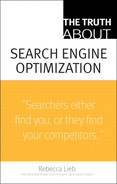Long, long ago, back in the mid-1990s, when search was young and the Internet bubble hadn’t burst, meta data was an important factor in search engine rankings. Although that’s no longer the case, ignoring meta tags in an SEO endeavor is not a good idea either. To find out why, let’s look at what meta tags are, and learn a little bit about their history, as well as their use in the here and now.
In the early days of the Web, HTML meta tags began to be incorporated into web page header information. Meta tags were and are included right along with the title tag, which was discussed in the previous Truth. However, it is important to note that title tags and meta tags are not one and the same. The function of meta tags is to help webmasters, as well as search engines, understand more about the web page. The text in meta tags is not displayed on the actual web page but is easily revealed by viewing the “page source” option in any web browser.
There are quite a few different elements of meta data, and not all of them are relevant to search. For instance, the meta language tag, a two-letter abbreviation that specifies the primary language the page copy is in, isn’t always relevant to search unless the site is multilingual. Or the meta revisit-after tag, which instructs search engines to recrawl the page’s content after a specified period of time (for example, a day, week, or month). The only problem with the meta revisit tag? It isn’t supported by any search engine. Moreover, it never was supported, and most probably never will be supported by a search engine.
Clearly, there’s no use discussing all the types of meta tags out there. For search engine optimization, only three meta tags are worth discussing—and only two of them really matter. Still, there are so many misconceptions about meta tags out there, it’s worthwhile discussing how all three can, and can’t, influence search engine optimization.
This tag is used only if you do not want pages indexed by search engines (and this is often the case). How and when to use this tag is discussed in Truth 51, “Sometimes you don’t want to be found.”
This tag contains the major keywords and key phrases on which a webmaster, publisher, or SEO wants a page to be found when they’re used in a search query, as well as rank highly in organic search results. For certain keywords, you just stick them in this meta tag and you’re golden, right?
Not so fast. If it sounds too good to be true, it probably is. In the case of meta keyword tags, this is one of the biggest SEO misconceptions. Years ago, people started to abuse meta keyword tags by filling them with useless or irrelevant words to achieve a higher rank. This worked...for a very short while. Thanks to the abusers, most major search engines (Google in particular) place little to no importance on the meta keywords tag. The best advice: Don’t bother. It’s no longer worth it.
This is the tag that matters most, and it’s well worth taking the time to craft a good page description. That’s because the text that comprises the description is displayed in search results just under the clickable title. Here’s an example—in this case, the first result on Yahoo! from a real Seattle-based personal injury lawyer’s website. The original query was for “seattle personal injury lawyer”. If you conduct this search yourself, note how Yahoo! highlights these terms in the text to indicate relevance with the search query:
Seattle Personal Injury
Hire an experienced personal injury lawyer for
all your legal needs. Bradley Johnson Attorneys
provides personal injury representation in
Western Washington. Call today.
www.personalinjurylawwashington.com
On the same day, Google delivered a different number-one result, but the meta description tag data appears in the description and also highlights the matching keywords in the query:
Seattle Personal Injury Lawyer | Seattle
Washington Personal...
Contact a Seattle accident attorney
experienced in many aspects of personal
injury law including, but not limited to,
premises liability, car and truck...
seattle.injuryboard.com
Although the meta description tag is not always featured on the search results page, it happens reliably enough to make this page element critical in SEO. The meta description tag may not be as much an influencer in actual results ranking as other elements such as title tags, page copy, and links, but because it’s the information a searcher sees about a search result (together with the page title), it’s a tremendous influencer when it comes to whether that user will click.
It’s, therefore, important to think of the meta description tag as a brief advertisement or call-to-action where the searcher is concerned. So, although it’s critical that the descriptive copy be honest, it can also be important to get a bit sexy—or persuasive (without going overboard, of course)—to drive traffic. Bear in mind as well that the meta description remains just that: a description. It’s not, nor is it intended to be, an actual ad. If the description misleads people or misrepresents a page’s content, they’re only one click away from leaving. Stay honest and straightforward.
Equally important when writing descriptions is to use keywords. As we’ve seen previously, matched search keywords are bolded. These can be quite persuasive when it comes to driving traffic from search results pages.
And as with titles, the goal is to accomplish these ends in very limited space. At present, Google displays up to 160 characters of a meta description tag (including spaces). Yahoo! shows up to 165 characters, whereas MSN will display more than 200. Google is the yardstick here. Stick to 160 characters or less.
And don’t forget that as with titles, every site page that you want users to find—and to click on—in search engines warrants its own carefully crafted and considered meta description.
